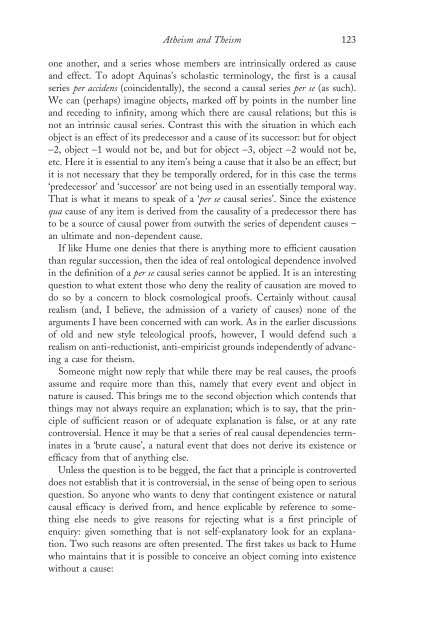Atheism and Theism JJ Haldane - Common Sense Atheism
Atheism and Theism JJ Haldane - Common Sense Atheism
Atheism and Theism JJ Haldane - Common Sense Atheism
You also want an ePaper? Increase the reach of your titles
YUMPU automatically turns print PDFs into web optimized ePapers that Google loves.
<strong>Atheism</strong> <strong>and</strong> <strong>Theism</strong> 123<br />
one another, <strong>and</strong> a series whose members are intrinsically ordered as cause<br />
<strong>and</strong> effect. To adopt Aquinas’s scholastic terminology, the first is a causal<br />
series per accidens (coincidentally), the second a causal series per se (as such).<br />
We can (perhaps) imagine objects, marked off by points in the number line<br />
<strong>and</strong> receding to infinity, among which there are causal relations; but this is<br />
not an intrinsic causal series. Contrast this with the situation in which each<br />
object is an effect of its predecessor <strong>and</strong> a cause of its successor: but for object<br />
−2, object −1 would not be, <strong>and</strong> but for object −3, object −2 would not be,<br />
etc. Here it is essential to any item’s being a cause that it also be an effect; but<br />
it is not necessary that they be temporally ordered, for in this case the terms<br />
‘predecessor’ <strong>and</strong> ‘successor’ are not being used in an essentially temporal way.<br />
That is what it means to speak of a ‘per se causal series’. Since the existence<br />
qua cause of any item is derived from the causality of a predecessor there has<br />
to be a source of causal power from outwith the series of dependent causes –<br />
an ultimate <strong>and</strong> non-dependent cause.<br />
If like Hume one denies that there is anything more to efficient causation<br />
than regular succession, then the idea of real ontological dependence involved<br />
in the definition of a per se causal series cannot be applied. It is an interesting<br />
question to what extent those who deny the reality of causation are moved to<br />
do so by a concern to block cosmological proofs. Certainly without causal<br />
realism (<strong>and</strong>, I believe, the admission of a variety of causes) none of the<br />
arguments I have been concerned with can work. As in the earlier discussions<br />
of old <strong>and</strong> new style teleological proofs, however, I would defend such a<br />
realism on anti-reductionist, anti-empiricist grounds independently of advancing<br />
a case for theism.<br />
Someone might now reply that while there may be real causes, the proofs<br />
assume <strong>and</strong> require more than this, namely that every event <strong>and</strong> object in<br />
nature is caused. This brings me to the second objection which contends that<br />
things may not always require an explanation; which is to say, that the principle<br />
of sufficient reason or of adequate explanation is false, or at any rate<br />
controversial. Hence it may be that a series of real causal dependencies terminates<br />
in a ‘brute cause’, a natural event that does not derive its existence or<br />
efficacy from that of anything else.<br />
Unless the question is to be begged, the fact that a principle is controverted<br />
does not establish that it is controversial, in the sense of being open to serious<br />
question. So anyone who wants to deny that contingent existence or natural<br />
causal efficacy is derived from, <strong>and</strong> hence explicable by reference to something<br />
else needs to give reasons for rejecting what is a first principle of<br />
enquiry: given something that is not self-explanatory look for an explanation.<br />
Two such reasons are often presented. The first takes us back to Hume<br />
who maintains that it is possible to conceive an object coming into existence<br />
without a cause:

















